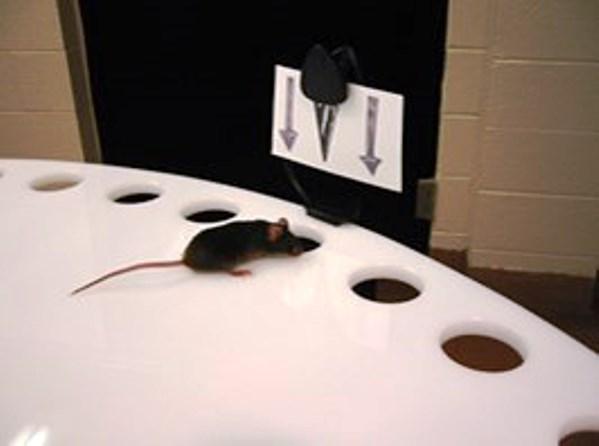Alzheimer's disease may affect as many as 5.5 million Americans and treatment costs are high with inconsistent benefits so one goal of science it to help stave off the disease or prevent it completely.
A research paper has correlated a compound found in green tea and exercise with slowing the progression of the disease in mice. More speculative is that it may reverse its effects.
Increases in inflammation have been linked to Alzheimer's disease patients and recent studies have suggested the benefits of dietary antioxidants in reducing the risk of AD. Based on previous research conducted at Mizzou, researchers decided to investigate the effects of voluntary exercise and epigallocatechin-3-gallate (EGCG), a green tea extract, on memory function and A-beta levels in mice known to show plaque deposits and behavior deficits.

In the study, mice were placed in the center of a specialized maze and allowed to move around with the aim of finding the right hole, or 'goal box.' Credit: MU News Bureau.
"In Alzheimer's patients, amyloid-beta peptide (A-beta) can accumulate and clump together causing amyloid plaques in the brain," said Todd Schachtman, a professor of psychology at the University of Missouri. "We looked at ways of preventing or postponing the onset of the disease which we hope can eventually lead to an improvement of health status and quality of life for the elderly."
First, mice were placed in the center of a specialized maze and allowed to move around with the aim of finding the right hole, or "goal box." The team watched the mice to determine whether or not they could find the goal box, demonstrating memory and cognition.
In the second test, small "nestlets," or squares containing materials to create nests, were placed in the habitats for different groups of mice. A day later, nests were scored based on shape and the amount of material used.
"Mice exhibiting symptoms of the disease had nests that were poorly formed or erratic," said Schachtman. "Further, we found that mice with Alzheimer's symptoms, much like people, can be apathetic about their habitat, or have forgotten how to 'nest' appropriately."
Researchers then administered EGCG in the drinking water of the mice and gave them access to running or exercise wheels. After re-administering the maze and nesting tests, they found remarkable improvements in the cognitive function and retention in the Alzheimer's affected mice that were given EGCG and were allowed to exercise.
Then colleagues analyzed mouse brain tissues to determine the effects of EGCG and exercise on A-beta levels in affected regions of the brain.
"Oral administration of the extract, as well as voluntary exercise, improved some of the behavioral manifestations and cognitive impairments of Alzheimer's, they concluded.
The study, "Beneficial Effects of Dietary EGCG and Voluntary Exercise on Behavior in an Alzheimer's Disease Mouse Model," was published in the Journal of Alzheimer's Disease with grant funding from the National Institute of Aging (AG018357) and NCCAM/ODS/NCI (AT006273).





Comments